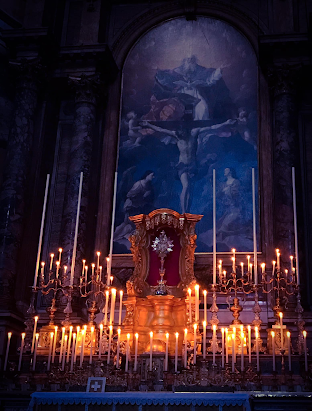First Sunday of Lent - conversion of body and soul
Pre-Lent Quarant 'Ore devotions in the FSSP parish in Rome.
As Septuagesima time gives way to Lent, the rigours of the penitential season commence once again. However, a daunting prospect of lengthy weeks filled with misery and self-inflicted sacrifices is not the Catholic spirit of Lent, although it may very well be the manner in which Lent is viewed by those outside the Church. But as Dom Gueranger notes, Lent is not a time to ban any joy, but rather a time to detach from the empty joys which are not oriented to God. “We have bade farewell to the vain joys and baubles of the world.”
Certainly, Gueranger also notes that Lent is a time for meditating upon the passion and death of Christ, which necessarily brings with it a “character of mournfulness and austerity.” But it is a character which is “fitting” to Lent, and one which nevertheless is always connected to the promise of the glorious Resurrection at Easter.
Gueranger also outlines the union found between body and soul during the period of Lent, highlighting the point nature of the penance which is necessary due to the joint action of body and soul in every sin.
“Now, Penance consists in contrition of the soul, and in mortification of the body; these two parts are essential to it. The soul has willed the sin; the body has frequently co-operated in its commission. Moreover, man is composed of both Soul and Body; both, then, should pay homage to their Creator. The Body is to share with the Soul, either the delights of heaven, or the torments of hell; there cannot, therefore, be any thorough Christian life, or any earnest penance, where the Body does not take part, in both, with the Soul.”
However, the conversion of heart which the Church calls Her children to during Lent is one which is effected in the soul, and it is there that the “reality” of penance is found, teaches Dom Gueranger.
“But it is the Soul which gives reality to Penance. The Gospel teaches this by the examples it holds out to us of the Prodigal Son, of Magdalene, of Zacheus, and of St. Peter. The Soul, then, must be resolved to give up every sin; she must heartily grieve over those she has committed; she must hate sin ; she must shun the occasions of sin. The Sacred Scriptures have a word for this inward disposition, which has been adopted by the Christian world, and admirably expresses the state of the Soul that has turned away from her sins: this word is, Conversion. The Christian should, therefore, during Lent, study to excite himself to this repentance of heart, and look upon it as the essential foundation of all his Lenten exercises.”
The sacrifices of Lent are oriented to this interior conversion, but must be accompanied by the exterior subjugation of the senses, in order to combat the dual effect of sin upon the soul and the body. “Nevertheless, he must remember that this spiritual penance would be a mere delusion, were he not to practise mortification of the Body. Let him study the example given him by his Saviour, who grieves, indeed, and weeps over our sins; but he also expiates them by his bodily sufferings. Hence it is, that the Church, - the infallible interpreter of her Divine Master’s will, - tells us, that the repentance of our heart will not be accepted by God, unless it be accompanied by fasting and abstinence.”
“Let us only courageously tread the way of penance, and the Light will gradually beam upon us. If we are now far off from our God by the sins that are upon us, this holy Season will be to us what the Saints call the Purgative Life, and will give us that purity, which will enable us to see our Lord in the glory of his victory over death. If, on the contrary, we are already living the Illuminative Life; if, during the three weeks of Septuagesima, we have bravely sounded the depth of our miseries, our Lent will give us a clearer view of Him who is our Light; and if we could acknowledge Him as our God when we saw him as the Babe of Bethlehem, our soul’s eye will not fail to recognize him in the divine Penitent of the Desert, or in the bleeding Victim of Calvary.”



Comments
Post a Comment